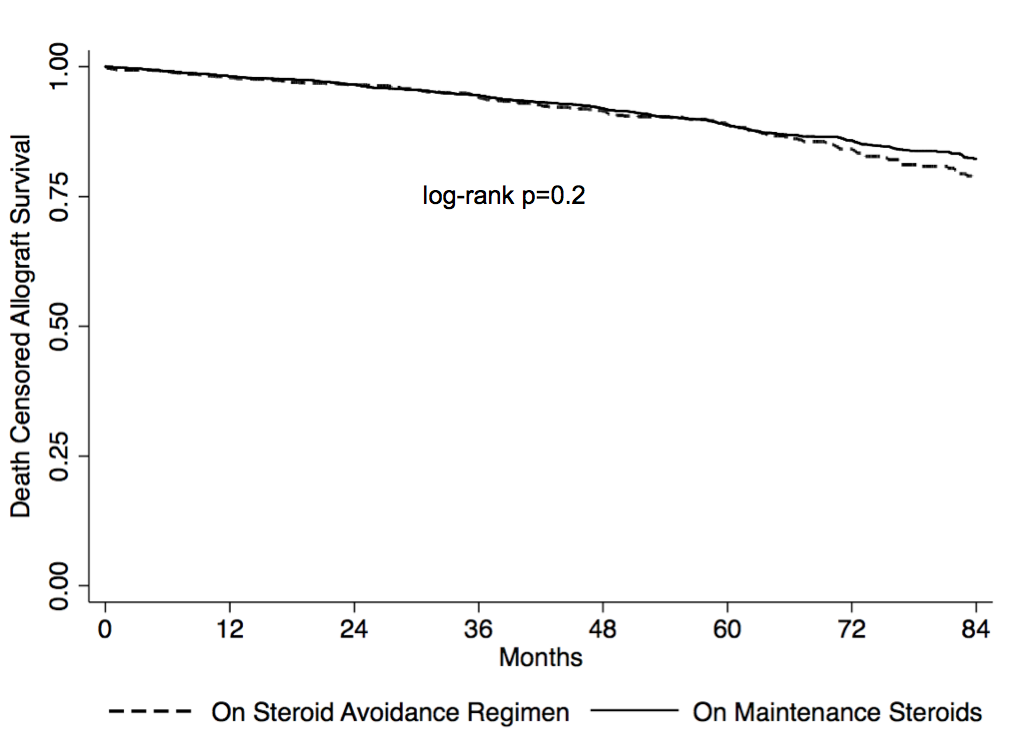Outcomes with Steroid Avoidance Regimen After Kidney Transplantation without Induction Immunosuppression.
1Medicine - Pulmonary and Critical Care Medicine, Mayo Clinic, Rochester, MN
2Internal Medicine - Nephrology, University of Michigan, Ann Arbor, MI
3Medicine - Nephrology and Hypertension, Mayo Clinic, Rochester, MN
Meeting: 2017 American Transplant Congress
Abstract number: 419
Keywords: Immunosuppression, Kidney transplantation, Outcome
Session Information
Session Name: Concurrent Session: Kidney Immunosuppression: Induction Therapy
Session Type: Concurrent Session
Date: Tuesday, May 2, 2017
Session Time: 2:30pm-4:00pm
 Presentation Time: 2:42pm-2:54pm
Presentation Time: 2:42pm-2:54pm
Location: E354b
INTRODUCTION: Use of induction immunosuppression therapy at the time of kidney transplantation is variable in low immunological risk kidney transplant recipients. Though acceptable allograft outcomes without induction therapy are seen in selected group of patients who are maintained on standard triple immunosuppression with tacrolimus, mycophenolic acid (TAC/MPA) and steroids, outcomes with steroid avoidance regimen remain unclear. We therefore designed this study to look into the allograft outcomes of low immunological risk patients who did not receive induction therapy and are on TAC/MPA based regimen.
METHODS: Using data from United Network for Organ Sharing Registry we identified adult patients (age≥18 years) with cPRA≤20 who received their first kidney transplant between Jan 1, 2008 to Jun 30, 2015 and did not receive induction therapy. Those with previous organ transplants, recipients of multiorgan transplants or those not on TAC/MPA regimens were excluded. We then divided this cohort into those with and without maintenance steroids. Our primary outcome was death censored graft survival.
RESULTS: Of 8,748 patients included in the study, 79.7% were on maintenance steroids. Patients on steroid avoidance regimens were more often ≥45yr old (75.7% vs 71.0%; p=0.001), males (72.7% vs 68.2%; p<0.001) and whites (54.0% vs 48.3%; p<0.001). They were also more likely to have polycystic kidney disease as a cause of renal failure (11.4% vs 8.5%; p<0.001). 1yr death censored graft survival was 98.1% in those on maintenance steroids vs 97.8% in those on steroid avoidance regimen. 5yr death censored graft survival was 88.7% in those on maintenance steroids vs 88.8% in those on steroid avoidance regimen (Fig 1).  CONCLUSIONS: Among low immunological risk patients who undergo kidney transplantation without any induction therapy and are maintained on TAC/MPA based regimens, steroid free regimen is associated with allograft outcomes comparable to that with maintenance steroids.
CONCLUSIONS: Among low immunological risk patients who undergo kidney transplantation without any induction therapy and are maintained on TAC/MPA based regimens, steroid free regimen is associated with allograft outcomes comparable to that with maintenance steroids.
CITATION INFORMATION: Sakhuja A, Naik A, Cibrik D, Amer H. Outcomes with Steroid Avoidance Regimen After Kidney Transplantation without Induction Immunosuppression. Am J Transplant. 2017;17 (suppl 3).
To cite this abstract in AMA style:
Sakhuja A, Naik A, Cibrik D, Amer H. Outcomes with Steroid Avoidance Regimen After Kidney Transplantation without Induction Immunosuppression. [abstract]. Am J Transplant. 2017; 17 (suppl 3). https://atcmeetingabstracts.com/abstract/outcomes-with-steroid-avoidance-regimen-after-kidney-transplantation-without-induction-immunosuppression/. Accessed February 27, 2026.« Back to 2017 American Transplant Congress
